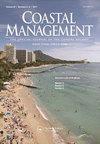社会经济因素、心理动机和社会网络在加纳妇女参与社区渔业管理中的作用
IF 1.9
4区 环境科学与生态学
Q4 ENVIRONMENTAL SCIENCES
引用次数: 1
摘要
妇女参与以社区为基础的渔业等自然资源管理决策被认为对渔业的可持续性至关重要。然而,尽管妇女作出了重要贡献,但她们在渔业任务和决策方面首当其冲地受到不平等待遇。利用一项针对加纳女渔民的民族志研究的调查数据(N = 400),我们研究了影响妇女参与社区渔业决策的因素。调查结果显示,虽然妇女参加社区会议,但只有少数妇女在渔业协会担任职务。虽然教育不是妇女参与社区的重要因素,但儿童的年龄、妇女对渔业资产的所有权以及诸如信任、利益和性别角色态度等心理特征是非常重要的。结果进一步表明,网络变量,如妇女在其他协会中的地位,对她们参与社区渔业决策比仅仅是这些协会的成员更重要。这项研究突出指出,旨在两性平等的渔业政策需要超越性别结构和经济模式,审查影响妇女参与渔业决策不同方面的各种因素的复杂性。本文章由计算机程序翻译,如有差异,请以英文原文为准。
The Role of Socioeconomic Factors, Psychological Motivations, and Social Networks in Women’s Participation in Community-Based Fishery Management in Ghana
Abstract Women’s participation in community-based decision-making in managing natural resources such as fishery is considered crucial to the sustainability of the fishery industry. However, women experience the brunt of inequality in fishery tasks and decision-making despite their crucial contributions. Using survey data (N = 400) from an ethnographic study on Ghanaian female fisherfolk, we examine the factors affecting women’s participation in community-based fishery decision-making. Findings show that while women attended community meetings, only a few held positions in the fishery associations. Whilst education was not a significant factor in women’s community participation, the age of children, women’s ownership of fishery assets as well as psychological characteristics such as trust, interests and gender role attitudes were very crucial. Results further show that network variables such as women’s position in other associations were more important to their participation in community-based fishery decision-making than mere membership in such associations. This study highlights the need for fishery policies aimed at gender equality to move beyond gender structures and economic models toward examining the complexity of factors affecting different aspects of women’s participation in fishery decision-making.
求助全文
通过发布文献求助,成功后即可免费获取论文全文。
去求助
来源期刊

Coastal Management
环境科学-环境科学
CiteScore
6.00
自引率
0.00%
发文量
24
审稿时长
>36 weeks
期刊介绍:
Coastal Management is an international peer-reviewed, applied research journal dedicated to exploring the technical, applied ecological, legal, political, social, and policy issues relating to the use of coastal and ocean resources and environments on a global scale. The journal presents timely information on management tools and techniques as well as recent findings from research and analysis that bear directly on management and policy. Findings must be grounded in the current peer reviewed literature and relevant studies. Articles must contain a clear and relevant management component. Preference is given to studies of interest to an international readership, but case studies are accepted if conclusions are derived from acceptable evaluative methods, reference to comparable cases, and related to peer reviewed studies.
 求助内容:
求助内容: 应助结果提醒方式:
应助结果提醒方式:


